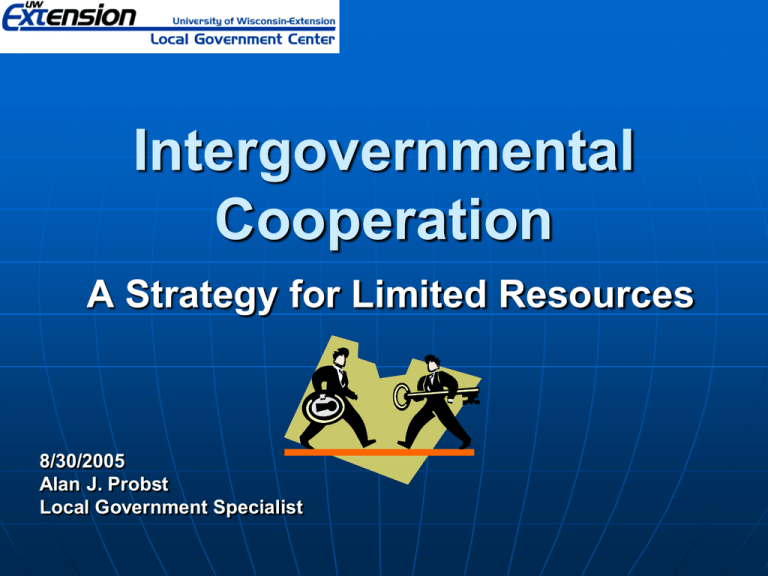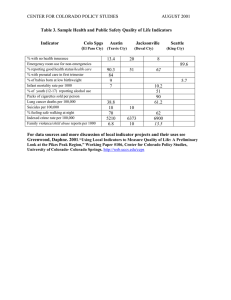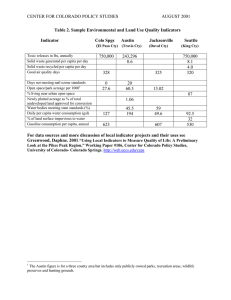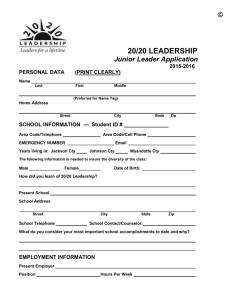
Intergovernmental
Cooperation
A Strategy for Limited Resources
8/30/2005
Alan J. Probst
Local Government Specialist
Intergovernmental
Cooperation
During times of limited and decreasing
revenues, cooperative efforts can
relieve pressure on local government
In some cases, it is required by State
Statute
Required Cooperation for MSA’s
Wisconsin Statute 66.0317 “requires” all
local governments in Metropolitan
Statistical Areas (MSA’s) to sign at least
two compacts with neighboring
municipalities or counties for provision of
joint services.
What’s an MSA?
Metropolitan Statistical Areas are defined by
the US Census Bureau
http://www.census.gov/population/www/estimates/metrodef.html
Wisconsin MSA’s
Appleton
Calumet Cty
Outagamie Cty
Eau Claire
Eau Claire Cty
Chippewa Cty
Green Bay
Brown Cnty
Kewaunee Cty
Oconto Cty
Fond Du Lac
Fond Du Lac Cty
Janesville/Beloit
Rock Cty
La Crosse
La Crosse Cty
Madison
Dane Cty
Columbia Cty
Iowa Cty
OshKosh/Neenah
Winnebago Cty
Wisconsin MSA’s
Cont.
Milwaukee-Waukesha-West Allis
Milwaukee Cty
Ozaukee Cty
Washington Cty
Racine
Racine Cty
Sheboygan
Waukesha Cty
Chicago-Naperville-Joliet, IL
Sheboygan Cty
Duluth, MN
Kenosha Cty
Minneapolis-St. Paul-Bloomington, MN
Pierce Cty
St. Croix Cty
Douglas Cty
Basic Types of
Intergovernmental Cooperation
Mergers
Cooperative Agreements
Other Cooperative Efforts
Mergers
Best Practices
Well crafted 66.0301 (2) agreements
Appoint a separate citizen/officials body
(board or commission)
Determine the objectives & goals of merger
Funding formulas must be clear & equitable
Best Practices
Mergers (cont.)
Consider use of existing equipment &
facilities
Include personnel in all discussions
Beware of union contracts that must be
renegotiated
Appoint a fiscal agent to handle
commission business
Best Practices
Mergers (cont.)
Remember that joint service
boards/commissions may not issue
independent debt
Consider a “disbanding” clause if things
don’t work as planned
Include ways to distribute excess assets
back to municipalities
Best Practices
Mergers (cont.)
Mergers rarely create short-term
savings
Prevent long-term inefficiencies
Savings must be measured over 3-5
years
Best Practices
Mergers (cont.)
Communicate
•Cooperate
•Collaborate
Merger Examples
Water plant
Wastewater Treatment Plant
Policing
Economic Development
Library Services
Parks & Recreation
Solid Waste & Recycling
Local Examples
Kimberly – Little Chute Police Merger
Established a Joint Police Department
Established a Joint Police Commission
Assigned a Fiscal Agent
72% satisfaction rating
Local Examples
North Shore Fire Department
Bayside-Brown Deer-Fox Point-GlendaleRiver Woods-Shorewood-Whitefish Bay
Used outside facilitator
7 member Board of Directors
Separate Fire Commission for hire/fire
Brown Deer appointed fiscal agent/separate
Comptroller
Major Challenges
Desire for community autonomy
Questions on allocation of costs
Fear of loss of service quality
Creating trust
Creating effective governance
mechanism
Cooperative Agreements
In cases where a full merger isn’t appropriate,
cooperative agreements may fulfill the need.
Police/Dispatch/PSAP
Tactical Response Teams
Fire/EMS
HAZMAT
Mutual Aid
Major Events
Shared Equipment
Crack router/emulsion pot
Brush chippers
Power brooms
Dirt shredders
Pavement rollers
Graders/backhoes/end loaders
Equipment for Service
Our chipper/your landfill
GIS
County provides aerials/village, town, and city
provide local data and assist with costs
Group Purchasing
Road Salt
Vehicles
Fuel
Infrastructure/Construction Materials
Services
Group Purchasing
Health Insurance
Cooperative health insurance
purchasing provides greater bargaining
power with providers
Texas example: 2 municipalities and 1
county achieved over $2 million in
savings over the first two years
Reduced costs; increased providers
Independent “stop loss” contracts
Cooperative Boundary
Agreements
Provides options to change borders and
avoid annexation conflicts
Works well for economic development
Losing entity may continue to collect
property taxes for a time after annexation.
Cooperative Boundary
Agreements (cont.)
Center for Land Use Education
http://www.uwsp.edu/cnr/landcenter/
Cooperative Boundary
Agreements (cont.)
Wisconsin Department of
Administration
http://www.doa.state.wi.us
Search: boundaries
Economic Development
Joint industrial/business parks
Combined advertising and marketing
Some grants and other funding sources
desire or require at least two different
governmental entities for application
University/College/Technical
College
Cooperation not limited to local
government units
Cooperative efforts with State and
VoTech schools can be beneficial
University/College/Technical
College (cont.)
Special programs and technical
assistance for economic development
Interns
Class projects
Shared construction
State Military Assets
Wisconsin Army National Guard can be
a resource
Annual training can be a local project
Combat Engineer units have most
ability to assist
Private Industry
Some private industry will partner on
projects for the benefit of advertising
value.
Utility companies for economic
development
Retailers, such as Wal-Mart, provide
grants and partnership for projects
Nationwide Examples of
Intergovernmental Cooperation
UC-Denver interns for administrative staff
Virginia Neighborhood Resources Center
California Joint City/County Family Center
Oregon rural, regional Public Services
Training Center
Where do we start?
Assess possibilities and resources in
your area
Define areas where most needed
Communicate with other governmental
bodies and other possible partners
Form a plan
Resources
Wisconsin Legislative Audit Bureau
Best Practices Review
“Local Cooperation to Maintain Roads”
available through link on University of Wisconsin –
Extension Local Government Center web site.
Resources
University of Wisconsin – Extension
web site provides a listing of
resources for intergovernmental
cooperation
http://www.uwex.edu/lgc/intergov/intergov.htm
Resources
University of Wisconsin-Extension
Local Government Center
Merger of City-Village Services
http://uwex.edu/lgc/intergov/pdf/bestpracticesbook.pdf
Resources
UW-Extension’s GREAT software
UW-Extension’s Community, Natural
Resources, and Economic
Development County Representative
UW-Extension Local Government
Center
www.uwex.edu/lgc/
Creativity Allowed
If it’s not prohibited by law, it may be worth
considering
Few ideas are completely without merit
Alan J. Probst
Local Government Specialist
234 Lowell Center
alan.probst@uwex.edu
(608) 262-5103
Copyright ©2006 by the Board of Regents of the University of Wisconsin System doing business
as the Division of Cooperative Extension of the University of Wisconsin-Extension. All Rights
Reserved.




